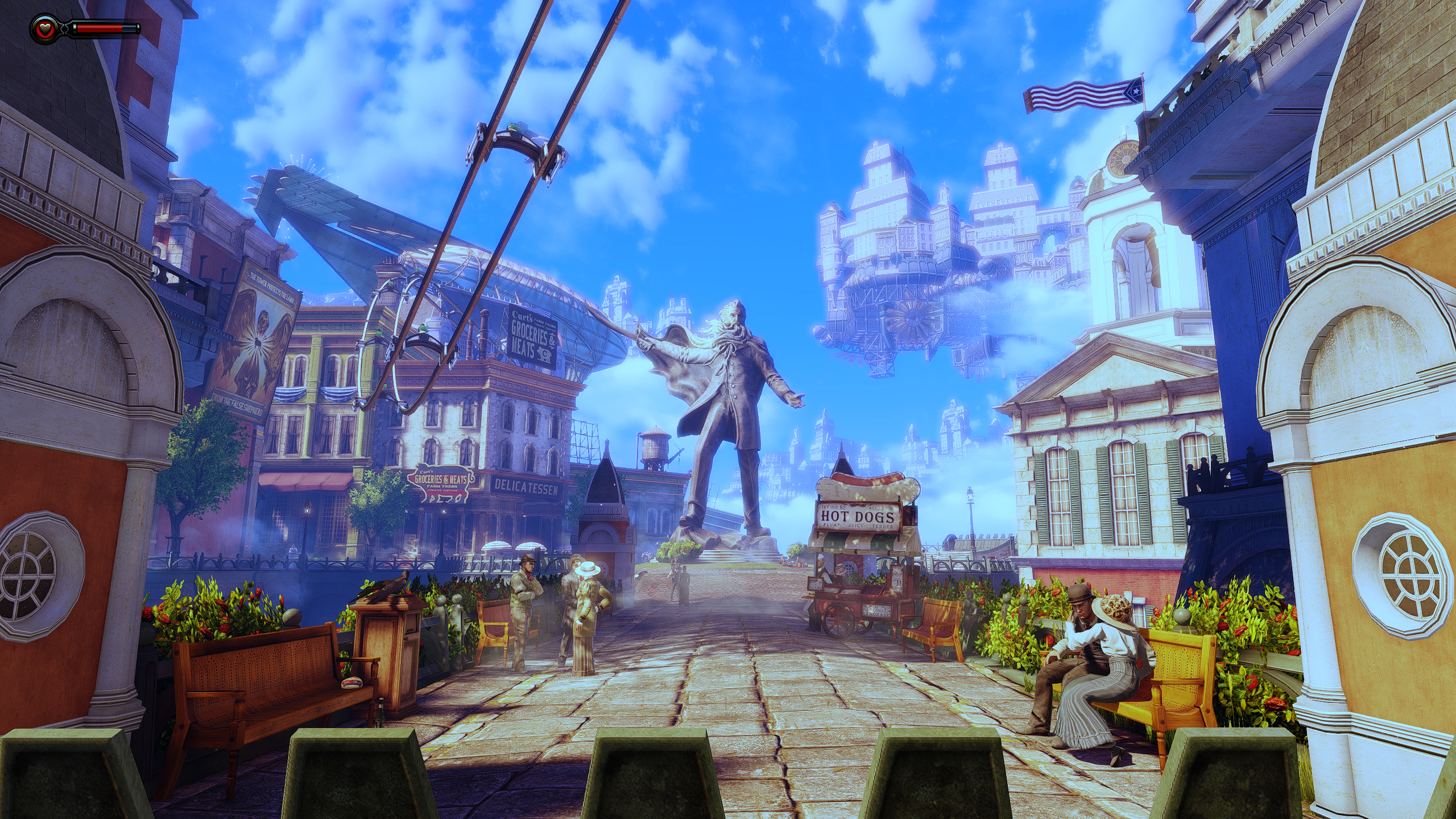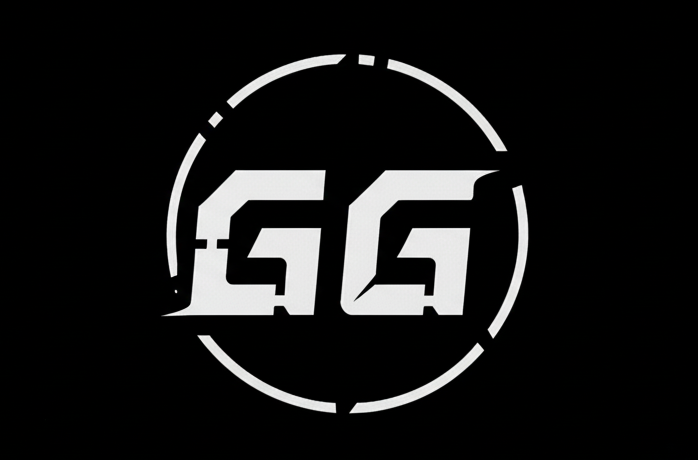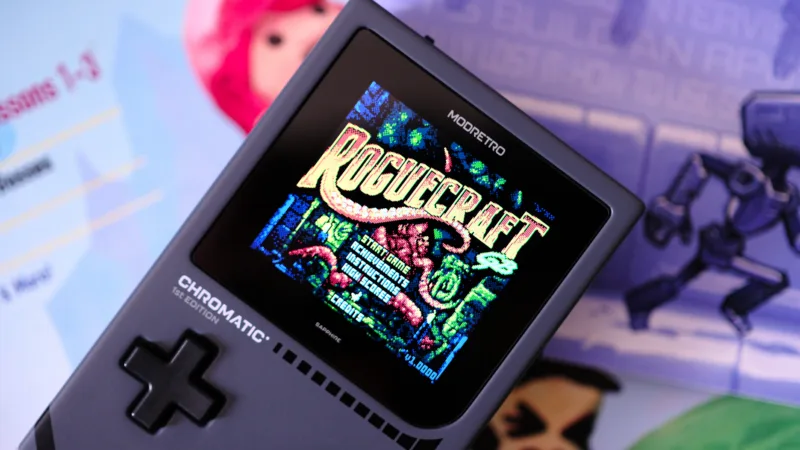One of my favorite games almost didn’t make it out of production hell. On August 9, 2012, Irrational Games brought in Rod Fergusson, famously known as a “closer” from his time at heavy-hitters Microsoft and Epic, to push the third BioShock installment toward its goal. BioShock: Infinite would hit shelves 7 months later and go on to nearly triple the sales of the timeless first entry, with 11 million copies sold.
PC gaming in 2007 was very different from what it was in 2013, and even more drastically removed from its current popularity. The original BioShock stands as one of the greatest titles ever, despite a seemingly paltry ROI, and you can tell as much from how fervent its fans are nearly two decades later. BioShock: Infinite doesn’t have quite the same rabid following, although by many accounts, it’s a very fun game.
But this isn’t a BioShock: Infinite review. And there will be spoilers ahead (suck it up, it’s a 12-year-old game).
The various reasons you think Infinite sucked
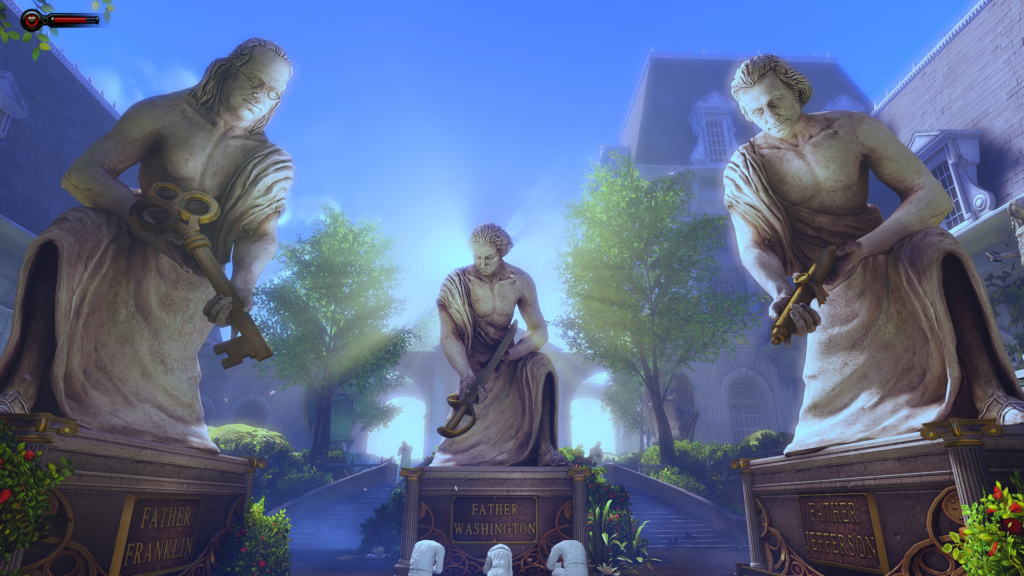
It jumped the shark right from the start
In light of Fergusson hopping on board Take-Two’s long-awaited BioShock 4 team — ostensibly with the goal of dragging it out of production hell, like he did with its predecessor so long ago — I thought I’d revisit one of the more divisive games in web discourse.
Infinite, now that was just trash
– Matt Sholtz (Guilty Gamer founder)
No game is perfect, although some argue BioShock was close. The OG underwater horror shooter made no bones about its thematically brutal storytelling from the jump. It was not a game for the faint of heart or those unwilling to practice using various intricate mechanics against mutated underworld ADAM addicts.
Infinite went about things a little… differently.
At least heavy-handed plotlines make for convenient villains
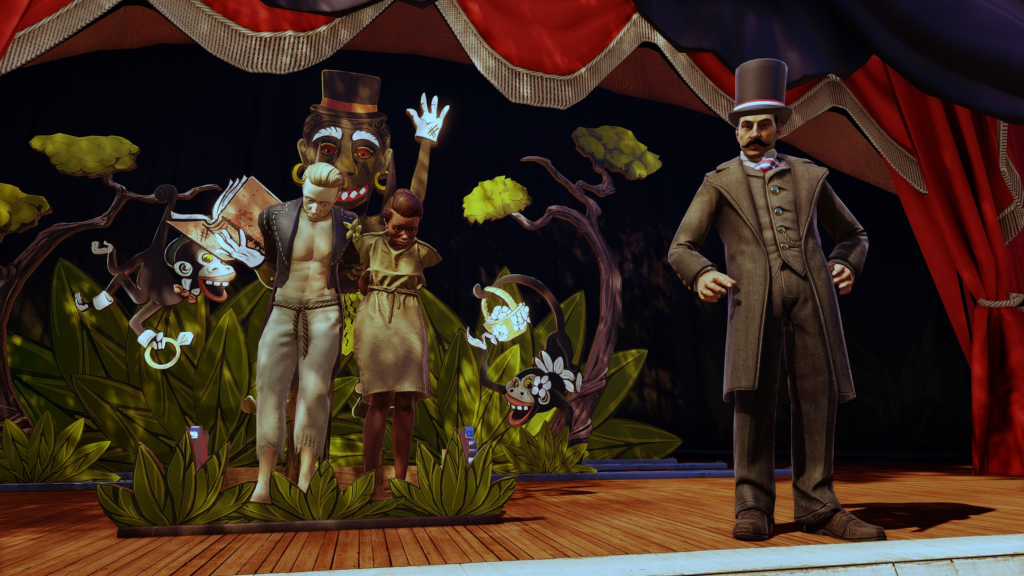
I can’t fully disagree with this criticism. Interestingly, I’ve never seen a game so equally criticized as both “woke” and “fascist” (for whatever those terms mean these days) as Infinite.
“Racism is bad” isn’t exactly a controversial take — nor a particularly creative one. But the B:I writers knew those things, and still opened with the “Lottery” scene. As much as the first installment leaned into absurd, Randian fantasy, it told a story more than it did immediately slap players in the face with racist, classist salami.
Almost as blatantly on-the-nose as “hurr durr, these losers hate mixing races,” comes the story’s second act. “Oh no,” the narrative conveniently shifts as the deuteragonists shift universes, “look at how the struggle for workers’ rights morphed into genocidal brutality! Maybe the lower-class workers are actually the bad guys!”
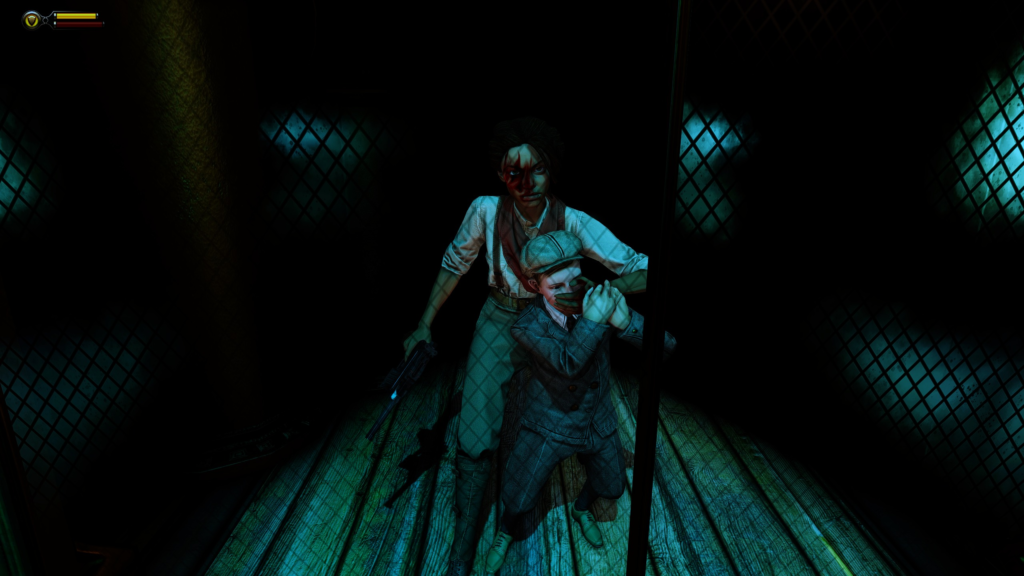
In fairness, it was Fitzroy’s attempt to murder a child that forced Elizabeth’s transition into a killer and caused her to empathize with Booker
Come the fuck on. You couldn’t write a more “both sides are equally bad” narrative if you tried. It deserves criticism — to a point. So why shouldn’t “the politics were overdone” matter much to anybody with half a brain? It’s simple, for me: Video games are the last place I look for moral guidance.
Take the player character’s own context. Booker Dewitt was a shitty person. Yeah, gambling addiction and alcoholism are diseases, etc., etc. — but the guy sold out his own daughter in multiple universes and, to atone for it, became a manipulative God-king figure bent on training a stolen version of his kid to destroy civilization. In this game, you play the bad guy. That is the story’s entire point.
Columbian upper-class citizens, the rampaging Vox Populi, the Lutece twins, and the guy you play as were all dicks (Liz was the only non-POS in the story, just about, and sacrificed her very existence to prevent Comstock’s rule). That was the point. Was it heavy-handed and over the top? Yes, but so were the art and gameplay (and I’ll get to both, don’t worry). It fits, it’s a flurry, and it’s fun.
“The story DiDn’T mAkE sEnSe!” Yes, it actually did
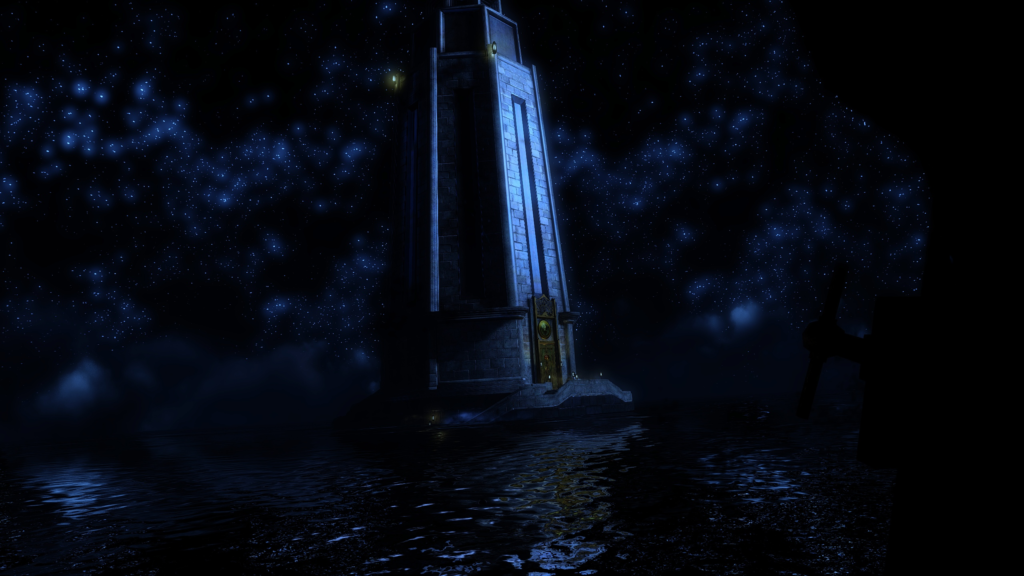
People LOVE to trot out the “infinite timelines mean that every possibility exists somewhere” trope, and for far more than just one silly little video game. But unless you’re Rick Sanchez, you don’t know that, and you don’t have any real grasp on how multiverses actually coexist. Obviously, nobody does, because we have no reason to believe they do coexist, outside of fiction.
Let’s break down that infinitely-popular fallacy (pun intended). Some B:I critics say that infinite timelines inexorably manifest all possibilities, a theory that lives somewhere between popular rhetoric and theoretical math. That would mean Comstock will always be alive somewhere, which would render the entire ending meaningless. Here’s why that’s wrong.
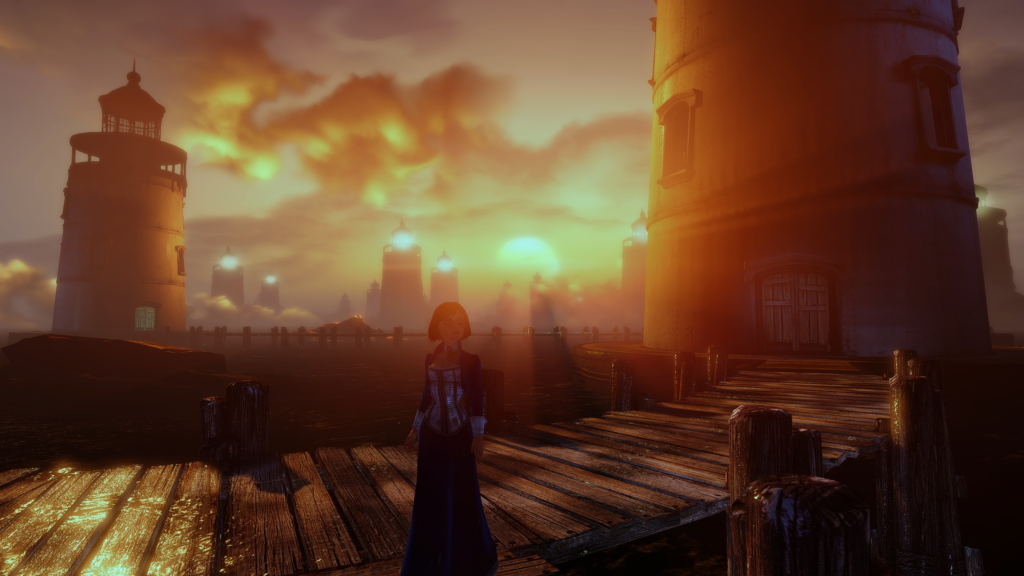
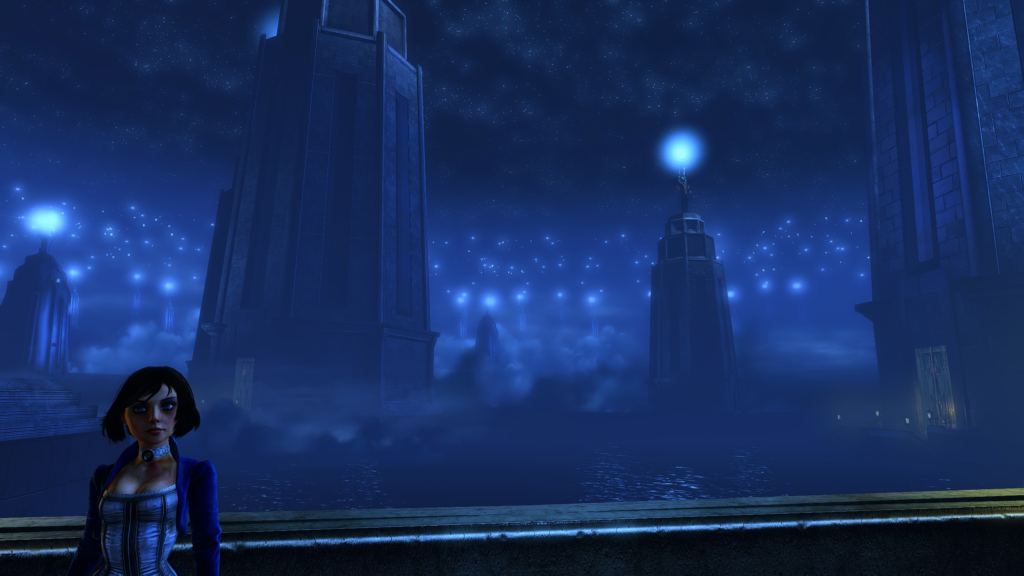
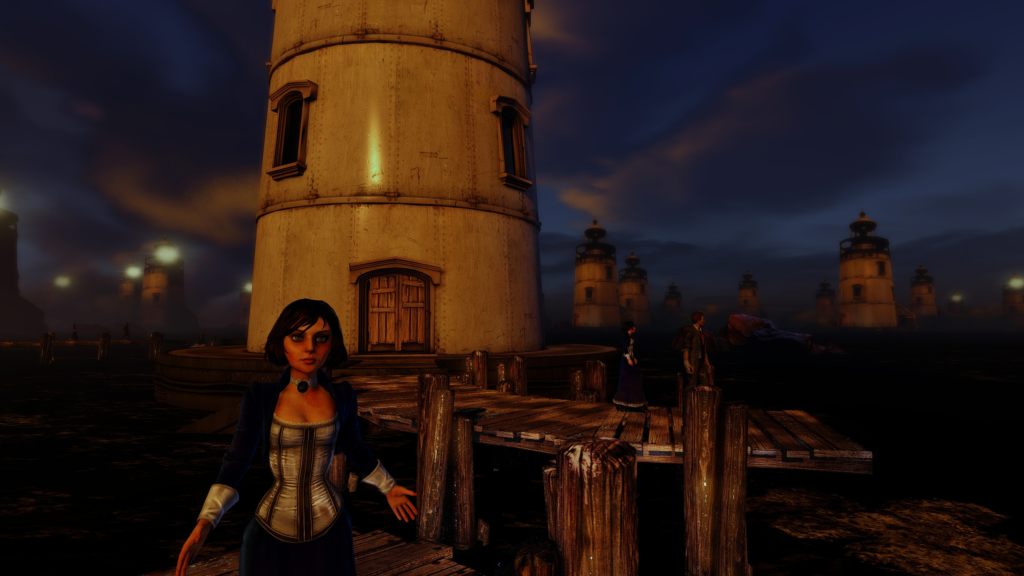
Mathematically speaking, the set from 0 to 1 contains infinite numbers. We can all agree on that. Now, exclude from that set all numbers beginning with 0.2 (or, story-wise, all timelines with a living Booker). The resulting set is still — wait for it — infinite.
If we assume Elizabeth attains omniscience after destroying the Siphon (and we kinda have to, because saying otherwise, “maybe she was just wrong,” is super handwave-y and delegitimizes the whole exercise), then she oughta know, right? Well, let’s ask the 19-year-old whiz kid: Is Comstock alive in infinite timelines even after I bludgeoned his face raw and drowned him in a birdbath?
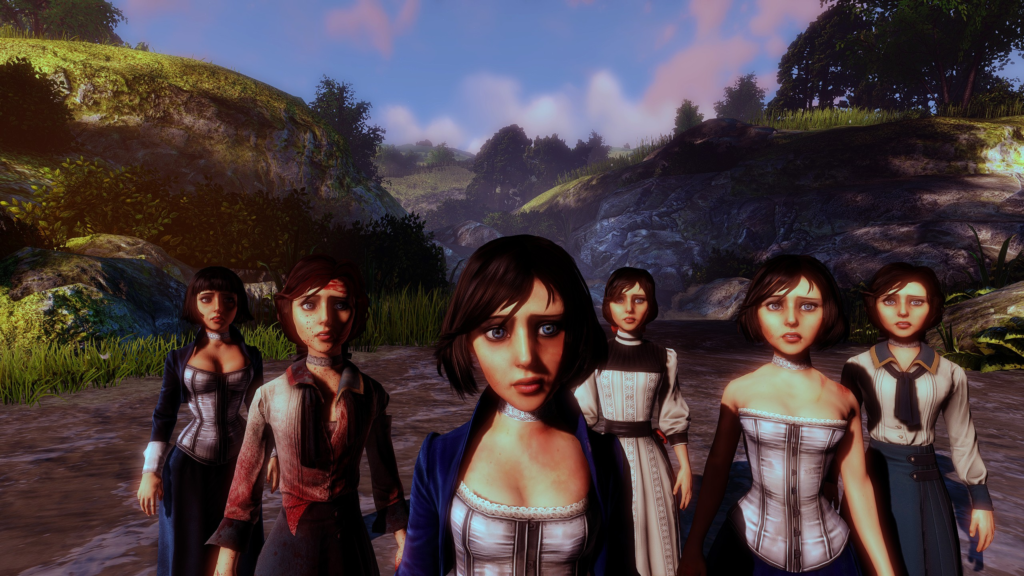
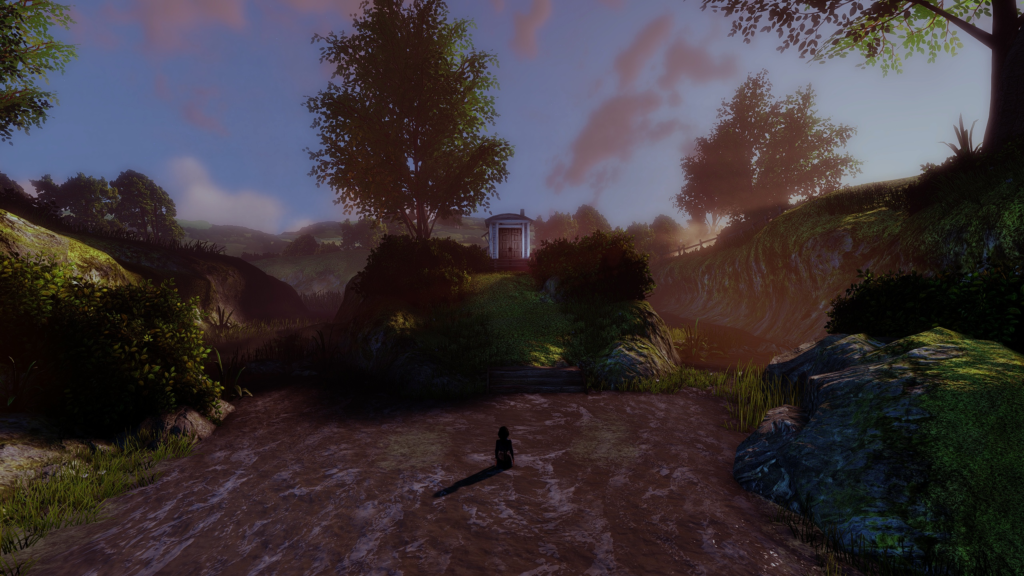
After the Elizabeths drown Booker/Comstock, they start disappearing. Apparently, the in-game universe itself blinks out of existence in the final frame
“No,” Elizabeth clearly explains, “He is alive in a million, million worlds.” That equals one trillion living Comstocks, and by my count, one trillion is a lot less than infinity. So, take it from the badass birdslayer bitch herself, there aren’t infinite Comstocks waiting to take over and start Columbia anew. She knows she’s about to drown the very first one, making him the last possible one, too.
Decent reasons to bitch about BioShock: Infinite
No game is perfect, but I’ve replayed this one dozens of times. The heavy-handed pseudopolitics really don’t bother me. A few things actually do, though. For example, the sound design is great — “Booker, catch!” might be the best Android notification sound in existence — but the repetitive, gear-like noises of the menus really grind my, well, gears. And a couple of gameplay and story issues do stick out, and could have been done better.
That screaming ghost lady can go (back) to hell
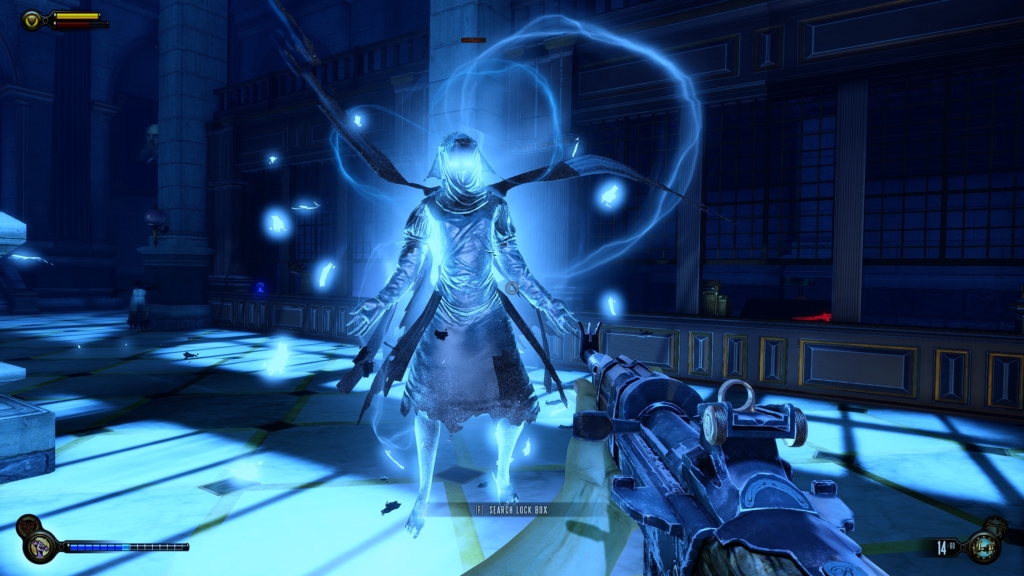
“Not of my womb, not of my womb!” Shut UP already, goddamn
In practically every boss-heavy game, you think you’ve overcome the big baddie, then suddenly, you haven’t. Anybody heard of Elden Ring? Malenia? Right.
But a “second phase” happens within one fight, and usually introduces a new, more complex mechanic to overcome. Making me fight the same stupid ghost three times in quick succession without any real change in tactics is straight-up lazy. It’s my biggest criticism with the game, not because it’s hard, but because they could have done something actually interesting with the Lady Comstock progression. If that’s your big gripe, I’m with you.
Stop teasing me and let me fight the fucking bird already
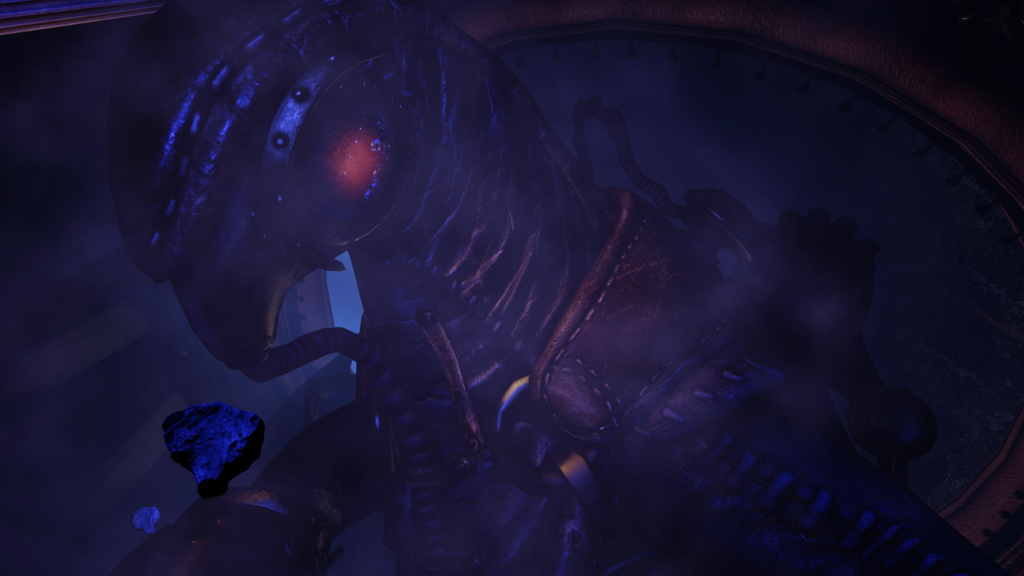
I almost thought I’d get to scrap with him this time. Sigh
Songbird was the Infinite universe’s offshoot of Big Daddies. Jeremiah Fink created him after spying on the Rapture constructs through a tear, and a complicated relationship developed after Elizabeth apparently saved the bird’s life before the story’s events. Regardless, I’ll always be bitter that Liz just cracked him under pressure while I watched helplessly. You’d think this massive, physio-magical behemoth would have some kind of IP rating. I guess not.
Don’t trot out this super-abomination literally all game long, string me along, and then kill him in a cutscene. This ties in with the ultimate battle, a somewhat out-of-place “defend the position” mission, providing a relatively disappointing climax, as far as endgames go. I don’t fault you a bit for being miffed at those two connected issues.
The main reason you might hate my favorite game (is a compliment to 2K)
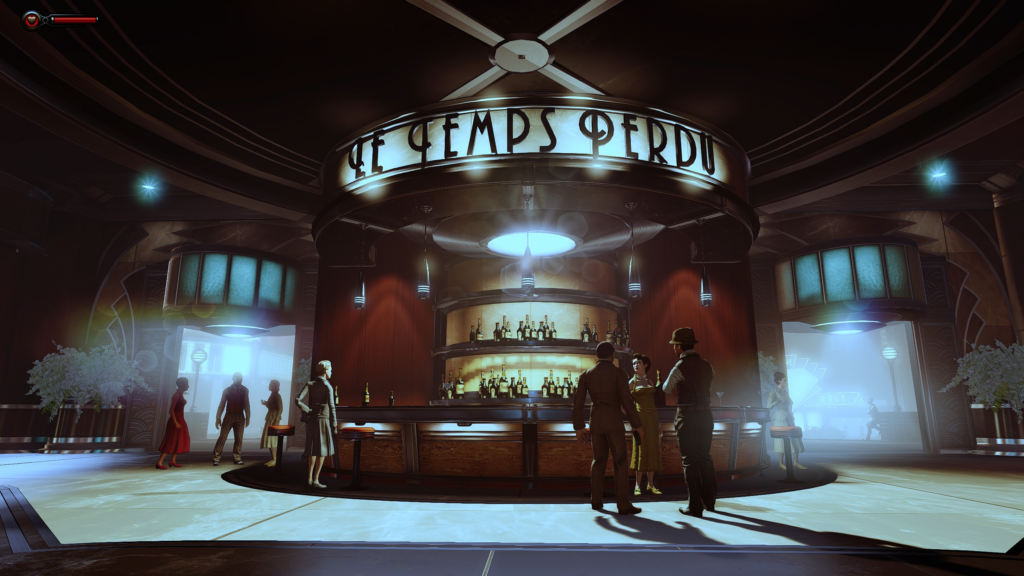
Rapture looks fantastic in Unreal Engine 3
I have to admit something in the interest of full disclosure. I’m actually not a huge fan of the original Bioshock. But that’s because it was so well done. I do, in fact, love the gameplay and general implementation. Actually, the art direction was so impeccable, it creeps me the hell out. And it’s a looong game. It’s an everlasting onslaught of horror and horror-adjacent visuals and concepts. Quite frankly, it was a psychological slog bordering on painful for me, personally, to finish. That’s a compliment to the original BioShock. I thought it was an amazing game, but I don’t foresee replaying it.
Fast-forward 6 years, and Ken Levine’s design style had clearly evolved. Everything changes, as it should. In this case, the tenor, speed, and fundamental gameplay of the BioShock series changed as well, and therein lies the problem. As molasses-slow as the protagonist of BioShock 2 was, Infinite’s gameplay hit the opposite end of the spectrum.
BioShock: Infinite is not BioShock 1
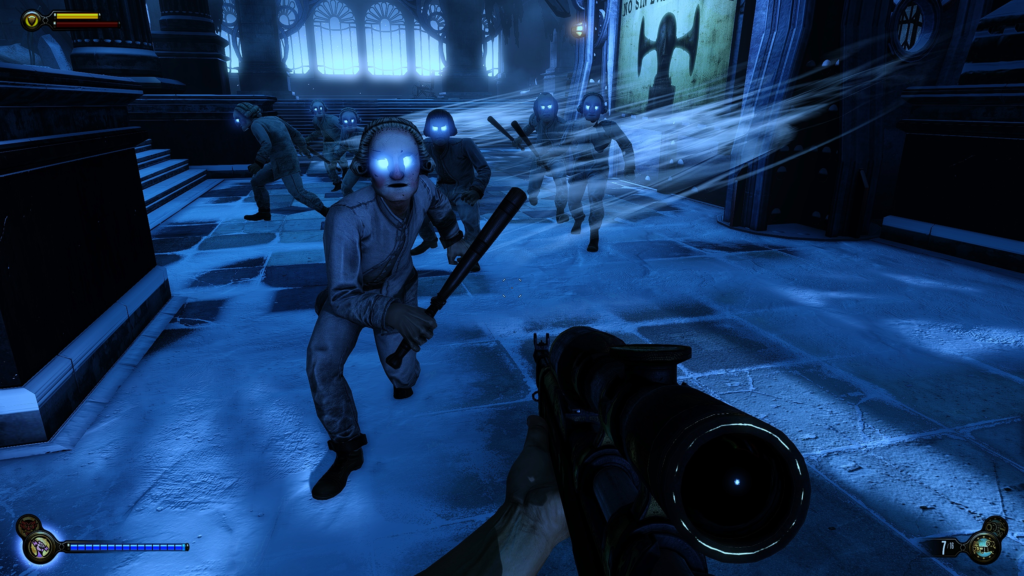
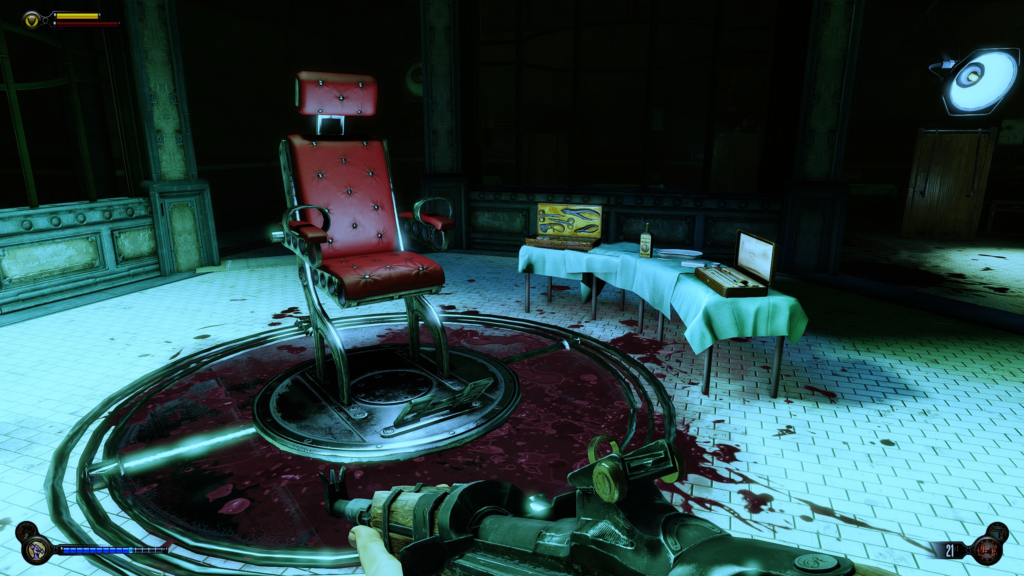
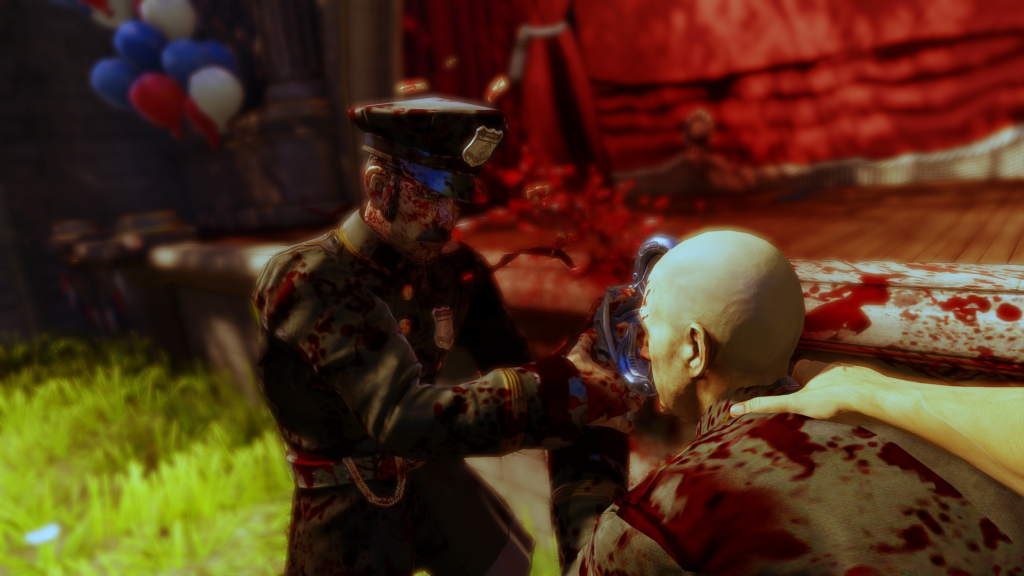
Infinite has its fair share of creepiness and gore, but the overall tone pales in comparison to the original
This is the rub, and I don’t blame anybody for hating it: Infinite was, in most ways, “BioShock in name only.” It lacked nearly all of that terrifying, horror theme that creeped me the hell out. Gone were the art deco overtone and suffocating underwater setting, in favor of a light, airy, at times cartoonish atmosphere. To me, Irrational piggybacked on the BioShock IP so heavily (despite apparently trying to distance it by not naming it “BioShock 3”) that this transgression should have been easy to portend.
Is Infinite’s gameplay simpler than the original’s? Absolutely. Is it anywhere near reasonable to imagine a protagonist carrying the OG BioShock’s utterly gigantic contingent of weapons and tools on their person? Obviously not; it’s the typical fantasy RPG level of delusion. While I have nothing against an inhuman level of inventory (I love the modern Fallout games, for example), Infinite simply went about it far differently. Two guns and a host of somewhat simplified innate powers make for a different kind of game.
Let me tie it up nicely. Most people hate BioShock: Infinite because the original was such a masterpiece that, when Infinite failed to mimic it in so many ways, it was doomed to piss off all the most fervent fans.
Sure, some people hate it because they’re not happy about shooting apparent white supremacists. Other people hate it because they’re not happy about shooting apparent workers’ rights activists. But I argue those groups are outliers, and the most vocal Infinite haters simply wanted more of a series that no longer exists.
Because, in the end, BioShock: Infinite is a great game. The sales numbers clearly show that. It was a fun game. My two dozen-plus replays show that, and I obviously have unimpeachable taste. But, even more importantly, the continued hatred for the game also shows that the original BioShock is still a peerless work of art.
And, no, it doesn’t need a remake.

